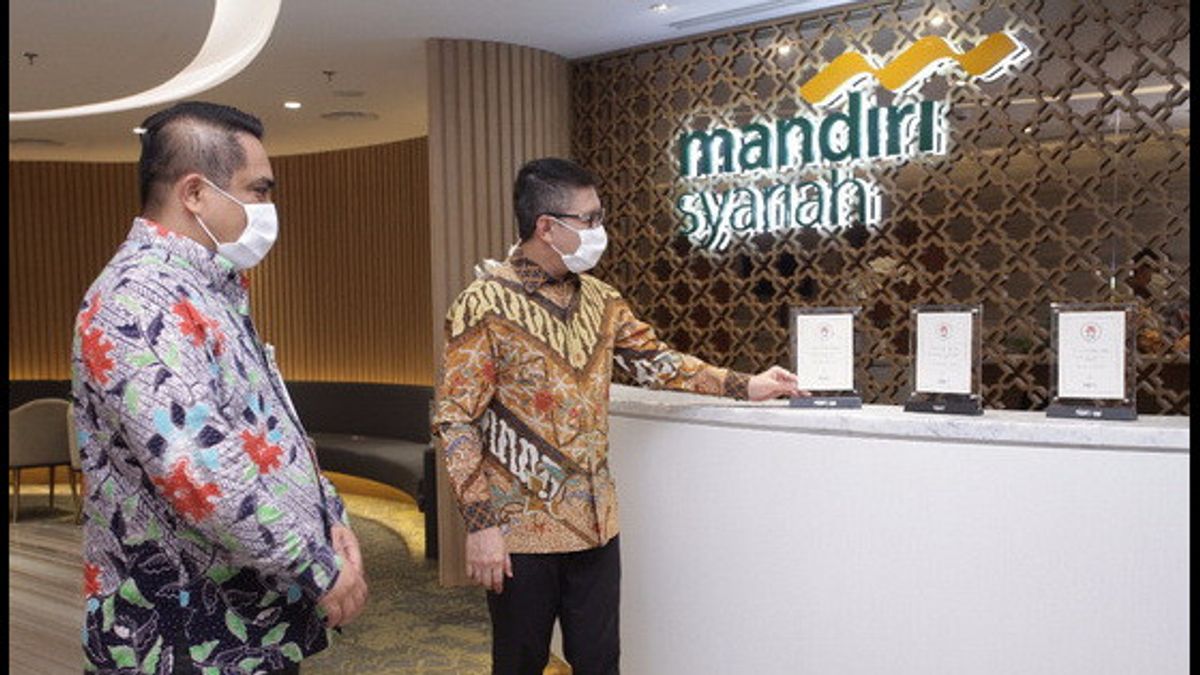JAKARTA - PT Bank Syariah Mandiri (BSM) is one of three national banks appointed by the government to diffuse to form Bank Syariah Indonesia. Two other financial services institutions are PT Bank Rakyat Indonesia Syariah Tbk (BRIS) and PT Bank Negara Indonesia (BNI Syariah).
It is hoped that the merger of the three state-owned banks will further focus the intermediation function in working on the national sharia market which has not been fully touched.
In the merger process, BSM holds the title as the largest sharia bank in Indonesia. In terms of performance, it is directly proportional to the label.
Quoting the company's latest financial report for the third quarter of 2020 on the official website, it was stated that Bank Syariah Mandiri managed to collect a net profit of not less than IDR 1.07 trillion. This figure is up 22.6 percent compared to the same period the previous year.
Meanwhile, BSM support contributed most by the increase in fee-based income, especially from digital services, gold-based products and consumer financing margin income.
Then for the banking intermediation sector, BSM financing is said to have touched a value of IDR 79.2 trillion or grew 7.3 percent compared to the third quarter of 2019.
The increase in the amount of financing was followed by the company's ability to maintain the quality of its distribution of funds with a net NPF (non-performing financing / NPF) ratio of 0.6 percent in September 2020 compared to September 2019 which was 1.6 percent.
Although it can be said that it is quite accomplished in terms of business activities, this does not automatically make BSM the leader of the Indonesian Sharia Bank. The government as the largest shareholder prefers BRIS as the parent entity, with the other two being merged into the core structure.
In fact, BSM is believed to have contributed 51 percent to the formation of Indonesian Sharia Banks. As of June 2020, the total assets of the three government Islamic banks are reported to be Rp. 214 trillion with a core capital of Rp. 20.4 trillion.
It is estimated that the main reason the country appointed BRIS was because this financial service institution had already become a public company compared to the other two banks so that it did not repeat the IPO (initial public offering) process if it wanted to be listed on the stock exchange floor.
In addition, BRIS is a subsidiary of the largest bank in Indonesia, namely BRI, with a consolidated asset record of Rp1,447 trillion as of September 2020.
Until the end of the third quarter of 2020, BRIS was known to have obtained a net profit of Rp. 190 billion with an asset of Rp. 56 trillion.
Meanwhile, BNI Syariah for the same period posted a net profit of Rp. 387 billion and assets of Rp. 52.3 trillion.
The difference in performance posture and assets between BSM and the other two banks is very striking. However, the government must have thought carefully about this matter.
The bank, which is projected to become the largest Islamic financial services institution in the republic, was established through a merger agreement signed on Wednesday, December 16, 2020.
Through the memorandum of understanding, it was agreed that Hery Gunardi (Managing Director of BRIS) as the President Director of Bank Syariah Indonesia. Followed by Ngatari (Managing Director of BSM) as deputy managing director I, and Abdulah Firman Wibowo (Managing Director of BNI Syariah) as deputy managing director II.
According to the plan, Bank Syariah Indonesia will start operating fully on February 1.
The English, Chinese, Japanese, Arabic, and French versions are automatically generated by the AI. So there may still be inaccuracies in translating, please always see Indonesian as our main language. (system supported by DigitalSiber.id)








